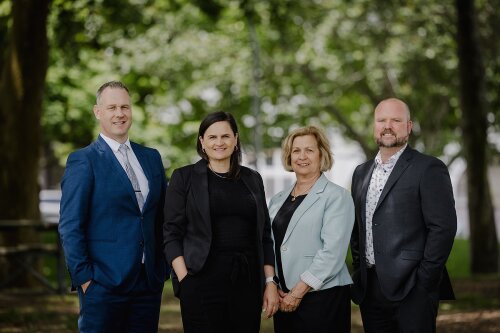Best Elder Abuse Law Lawyers in Cambridge
Share your needs with us, get contacted by law firms.
Free. Takes 2 min.
List of the best lawyers in Cambridge, New Zealand
1. About Elder Abuse Law in Cambridge, New Zealand
In Cambridge, as in the rest of New Zealand, there is no separate standalone “elder abuse law.” Instead, elder abuse is addressed through a combination of civil, criminal, and regulatory frameworks that protect older adults. This means complaints may involve civil remedies, criminal charges, or regulatory actions against health and aged care providers.
Key protections come from national statutes and agencies that oversee health, disability, guardianship, and law enforcement. For residents of Cambridge, the local health system is part of Te Whatu Ora Waikato, which coordinates hospital and community services in the region including aged care support. This structure affects how complaints about elder care are processed locally.
“Older adults have rights when receiving health and disability services under New Zealand law, and providers must respect those rights.”
Official resources from government agencies guide how elder abuse is recognised, reported, and acted upon. For example, the Health and Disability Services Consumers' Rights Act 1994 sets out consumer rights in health and aged care services, while the Health and Disability Commissioner handles complaints about service providers. These frameworks are central to Cambridge residents seeking redress or protection.
Recent health system reforms in New Zealand, including the 2022 restructuring into Te Whatu Ora, affect how aged care and related services are delivered across regions like Waikato. This change emphasizes standardised quality and clearer pathways for complaints and escalation.
Useful citations and sources include the Health and Disability Commissioner and legislation databases for the exact powers and processes described above. See their official pages for precise provisions and procedures.
2. Why You May Need a Lawyer
- Aged care facility concerns in Cambridge. You suspect neglect or abuse at a local rest home or hospital and need formal guidance on reporting to the Health and Disability Commissioner (HDC) and pursuing remedies. A lawyer can help document concerns, communicate with the provider, and navigate the HDC process.
- Guardianship or property decisions for an incapacitated relative. If a parent or relative cannot manage personal care or finances, you may need help using the Protection of Personal and Property Rights Act 1988 to appoint guardians or managers. A solicitor can prepare applications and represent you in court, if needed.
- Financial exploitation or scams against an older person. If a Cambridge elder is subjected to theft or misuse of assets, a lawyer can assess civil options and coordinate with police if a crime is involved, including potential criminal charges under the Crimes Act 1961.
- Civil claims for injuries or harm caused by care providers. You may pursue negligence or breach of rights against a facility or individual care worker. A legal claim can help recover losses, arrange interim protections, and secure accountability.
- Reporting and escalation where regulatory standards are not met. If a provider fails to meet statutory rights or licensing obligations, a solicitor can help escalate the matter to HDC, the relevant regulator, or the courts as appropriate.
3. Local Laws Overview
This section highlights the core statutes and regulatory frameworks that commonly underpin elder abuse matters in Cambridge. They apply nationwide in New Zealand but are implemented and enforced through local health providers and courts.
Health and Disability Services Consumers' Rights Act 1994 protects the rights of consumers in health and disability services, including older adults in care settings. It establishes rights such as respect, informed consent, and safe treatment, with enforcement primarily through the Health and Disability Commissioner. Effective since 1994, it remains a central reference point for complaints about care quality and abuse in aged care facilities. Legislation NZ (official statute).
Health and Disability Commissioner Act 2000 created the Health and Disability Commissioner (HDC) to oversee complaints about health and disability services and to promote rights protection. It provides a mechanism for independent investigation and resolution of complaints, including elder care issues. Legislation NZ (official statute).
Protection of Personal and Property Rights Act 1988 enables the court to appoint guardians or managers for adults who cannot consent to or manage personal care or property. This is a key tool for protecting elders who lack decision-making capacity and who may be vulnerable to abuse or exploitation. It includes processes for enduring powers of attorney and court supervision. Legislation NZ (official statute).
Crimes Act 1961 covers criminal offences that can be relevant to elder abuse, including assault, ill treatment, and financial exploitation. If abuse is suspected to be criminal, police investigation and potential prosecution may follow. Legislation NZ (official statute).
In 2022, New Zealand reorganised its health system under Te Whatu Ora and related structures, affecting how health and aged care services are delivered in Cambridge. This shift aims to standardise care quality and streamline complaint pathways across regions. Te Whatu Ora - Health NZ.
4. Frequently Asked Questions
What is elder abuse in Cambridge, NZ?
Elder abuse includes physical, psychological, emotional, financial, or sexual harm, as well as neglect. It can occur in homes, care facilities, or community settings. It is illegal and can be addressed through civil, criminal, or regulatory channels.
How do I report elder abuse in Cambridge?
Start by contacting the local Health and Disability Commissioner Office or police if a crime might be involved. You can also discuss concerns with a solicitor who can guide you through formal complaints and documentation. The HDC provides a formal complaints process for health and disability services.
When should I hire a lawyer for elder abuse concerns?
Hire a lawyer when you need to pursue civil remedies, establish guardianship or management under PPPR Act, or navigate complex reporting to HDC or police. Early legal advice helps preserve rights and evidence.
Where can I get free or low-cost legal help for elder abuse issues in Cambridge?
Local community law centers and some law firms offer initial consultations at low or no cost. Check with the Cambridge legal aid offices or pro bono programs in Waikato. A solicitor can identify eligible options and funding sources.
Why use the Protection of Personal and Property Rights Act 1988?
The PPPR Act provides a legal framework to appoint guardians or managers for adults who cannot manage personal care or property. It protects vulnerable elders from exploitation and ensures decisions are made in their best interests.
Can a lawyer help with an enduring power of attorney in New Zealand?
Yes. A lawyer can explain EPA concepts, prepare the documentation, and ensure it aligns with the Act and local court requirements. They can also advise on when an EPA should be replaced or revoked.
Do I need to go to court for elder care matters?
Not always. Many cases are resolved through complaints to HDC or negotiations with providers. Some situations, such as guardianship or serious disputes, may require court involvement under PPPR Act or other statutes.
How much do elder abuse legal services cost in Cambridge?
Costs vary by case complexity and the lawyer’s rates. Some firms offer fixed-fee or initial consultations. Ask for a clear engagement letter outlining fees and potential disbursements before work begins.
How long does a typical elder abuse case take in NZ?
Civil matters can take several months to a year or more, depending on evidence and court schedules. HDC complaints may take weeks to months for initial response and resolution, or longer if escalated.
Is elder abuse a crime in New Zealand?
Yes, criminal acts such as assault or financial exploitation can be charged under the Crimes Act 1961. Criminal investigations are handled by the New Zealand Police, separate from civil or regulatory processes.
What is the difference between a solicitor and a barrister for elder abuse cases?
A solicitor usually handles investigations, document preparation, and client liaison. A barrister represents clients in court or tribunals when a case goes to trial. In most elder abuse matters, you will interact with a solicitor and may use a barrister if court advocacy is required.
5. Additional Resources
- Health and Disability Commissioner (HDC) - Receives and investigates complaints about health and disability services and promotes rights under the Health and Disability Services Consumers' Rights Act 1994. Website: hdc.org.nz.
- New Zealand Legislation - Official database of Acts and regulations, including the PPPR Act 1988, Health and Disability Services Consumers' Rights Act 1994, and Crimes Act 1961. Website: legislation.govt.nz.
- New Zealand Police - Receives reports of elder abuse and handles criminal investigations where appropriate. Website: police.govt.nz.
6. Next Steps
- Identify the issue and collect documentation. Gather notes, dates, photos, medical records, and any communications with care providers. Do this within 1-2 weeks to preserve evidence.
- Consult a Cambridge elder abuse solicitor. Schedule an initial meeting to discuss the facts and potential options. Expect to pay for the first consult, or request a free initial assessment where available. Complete this within 2-4 weeks.
- Choose the appropriate path with your lawyer. Decide whether to file a complaint with HDC, pursue civil remedies, or start guardianship proceedings. Your lawyer will outline steps and timelines. Target decision within 1-2 weeks after the consultation.
- Prepare and submit formal requests or applications. Your solicitor will draft complaints, court applications, or guardianship papers and file them with the appropriate authority. Timeframes depend on the process selected but plan 2-6 weeks for initial filings.
- Engage with regulators or courts as required. If pursuing HDC, engage in the regulator's process. If guardianship or civil action is involved, attend negotiations or court hearings as scheduled. Expect ongoing processes over several months.
- Review funding and support options. Inquire about legal aid, pro bono services, or other funding to assist with costs. Your solicitor can guide you to eligible programs within 2-6 weeks.
- Stay informed and update your plan as needed. Monitor progress, adjust strategy with your legal counsel, and maintain documentation. Regular reviews help keep you on track over the course of the matter.
Lawzana helps you find the best lawyers and law firms in Cambridge through a curated and pre-screened list of qualified legal professionals. Our platform offers rankings and detailed profiles of attorneys and law firms, allowing you to compare based on practice areas, including Elder Abuse Law, experience, and client feedback.
Each profile includes a description of the firm's areas of practice, client reviews, team members and partners, year of establishment, spoken languages, office locations, contact information, social media presence, and any published articles or resources. Most firms on our platform speak English and are experienced in both local and international legal matters.
Get a quote from top-rated law firms in Cambridge, New Zealand — quickly, securely, and without unnecessary hassle.
Disclaimer:
The information provided on this page is for general informational purposes only and does not constitute legal advice. While we strive to ensure the accuracy and relevance of the content, legal information may change over time, and interpretations of the law can vary. You should always consult with a qualified legal professional for advice specific to your situation.
We disclaim all liability for actions taken or not taken based on the content of this page. If you believe any information is incorrect or outdated, please contact us, and we will review and update it where appropriate.










